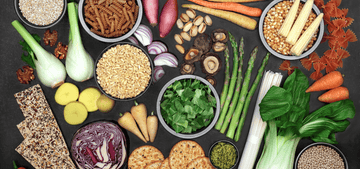A couple of decades ago, if you posted an article about vegan bodybuilding, you’d be hit with comments stating that it’s not possible to meet your protein needs on a plant-based diet. In 2023, not only is veganism accepted as a tool for improving health, strength, and muscle, but it has been embraced by countless bodybuilders, powerlifters, and athletes.
Meeting your protein requirements on a plant-based diet can be easy with proper planning. Learning the amounts of the macros in plant-based foods can take a little time, but once you track your favorite foods, you will know that a PB & Banana sandwich on Dave’s Killer Bread is 25g of protein and a bowl of oatmeal with pepitas and walnuts is 25g of protein. It becomes super easy.
So, whether you’re a bodybuilder switching to a healthy plant-based diet or a hardcore herbivore looking to add more muscle, here are some tips for optimizing your macros.
Plan Your Calories
Everyone knows how to build muscle. You eat a lot, put on fat and muscle, and then cut your calories and increase your cardio to lose fat.
You bulk, you cut, and you achieve your goals. Right?
Not exactly. That was certainly the theory a generation ago, but modern science suggests otherwise. Numerous studies have shown that you can gain muscle while losing fat, provided you consume an adequate amount of protein and perform strength training. (1)(2)
So, if you have a few pounds to lose, reduce your calories; if you want to gain weight, increase them. Use a simple BMR calculator to find your basal metabolic rate (the calories you burn at rest), calculate your exercise and daily activities, and build from there.
Aim for 10% more calories for steady weight gain and 10% less for healthy weight loss.
Whole food plant-based diets are nutrient-dense and generally higher in fiber (there’s zero fiber in animal foods), so your microbiome will thank you. As whole plant foods are higher in energizing complex carbs and prebiotic fiber and lower in unhealthy fats, it’s important to track your calories and make sure you’re hitting your nutritional targets. Here are a few apps to help with this:
- MyFitnessPal
- Cronometer
- MyPlate
- Nutritionix
- Calorie Counter Pro
Don’t Obsess Over the Amount of Protein
A 1988 study found that bodybuilders required an amount of protein that was “only slightly greater than that for sedentary individuals”, recommending around 0.55g/lb or around 108g for the average male.(3)
Many studies have shown that if your protein intake (and overall leucine intake) is sufficient (1.6g/kg of body weight), the source of the protein (plant vs animal) does not make a significant difference in the amount of muscle gains.(4)(5)(6)(7)
Set yourself a rough target and try to reach it, but don’t obsess. It’s easy if you separate your daily macro goals into how much you need per meal. Here is my example: I weigh 177lbs (80kg) x 1.6g of protein per kg of body weight 80 x 1.6g = 128g of protein. I divide that by 4 meals per day = 32g of protein per meal. A tub of hummus and 2 whole wheat pitas is about 25-30g of protein. A bowl of 3-bean chili and Beyond Burger about 35-40g protein.
If you have lower protein meals, adding in a vegan protein bar or protein shake is an easy way to stay on track.
The “Plants are Incomplete Proteins” Myth
“All plant foods contain all 20 amino acids, including the 9 indispensable amino acids (EAAs)." (8)
There are only 2 true “incomplete proteins” and they are gelatine (bone broth) and animal collagen, which are both missing the EAA tryptophan. Both are animal proteins.
So, where did the idea that plant proteins are “incomplete” come from? They compared plant and animal proteins and found that plants, generally, are lower in the 2 Sulfur Amino Acids (SAAs) methionine and cysteine than animal proteins. But it turns out that’s a good thing!
Too much methionine can feed cancer cell growth and restricting intake of methionine can increase longevity! So, we now know we had it wrong – it’s not that plants are “too low” in certain amino acids, it’s that animal proteins are too high in them.(9)
It is nearly impossible to not get sufficient amounts of any of the essential amino acids as long as you are eating a variety of plant proteins and consuming a sufficient amount of total protein per day. In addition to dietary protein, the body recycles up to 90g of protein from dead microbes in your gut, as well as used enzymes, and mucosa. Your body also “pools” amino acids to make up for any minor fluctuations in meals and daily intake. So, you can relax and just focus on hitting your total daily macros.(10)
There are a variety of great sources of plant-based proteins, including the following:
- Seitan: A low-fat, high-protein substance made from gluten. It contains around 25g of protein per 140-calorie serving. Seitan has a meaty texture and it’s very versatile. It is also high in selenium and other key nutrients.
- Lentils: A fantastic source of protein, with about 10g per 120 calories. Lentils are also high in fiber, folate, and iron.
- Tofu and Tempeh: Tofu is a relatively flavorless substance that’s high in protein and low in calories. It can be added to a host of dishes. Tempeh is a fermented version and has a little more flavor.
- Beans: A great source of fiber and protein, beans come in many shapes and sizes and can be made into a variety of dishes.
- Nutritional Yeast: Often used as a cheese substitute, nutritional yeast adds a cheesy, nutty flavor to foods and is high in protein, delivering around 5g for a small 10g serving. It’s also a good source of fiber, potassium, B12, and essential fatty acids.(8)
- Hemp, Chia, Flax, and Ahiflower: These are some of the best plant-based sources of essential omega-3 and omega-6 fatty acids.
-
Peas: Give peas a chance! These juicy, sweet vegetables are packed with fiber and protein. They are also versatile. Green peas make for a great side dish while split peas (a variant produced by peeling, drying, and “splitting” green peas) can be made into delicious high-protein dips like fava or dal.
Check Your Carbs
Eating enough complex carbs is usually not an issue on a whole food plant-based diet, but it can become an issue if you start stressing over protein and ignoring everything else.
A typical plant-based diet includes about 55-60% carbs. It will keep your energy levels high and ensure you’re sufficiently fueled for each workout. Here are some tips for getting the most out of your plant-based carbs:
- Don’t neglect grains: Barley, quinoa, bulgur wheat, and other grains are nutrient dense.
- Choose wholegrain options: You don’t need to abstain from bread, pasta, and other high-calorie foods, but if you want to optimize your diet, stick with wholegrain alternatives. They are higher in key nutrients and fiber.
- Snack on fruit: Instead of candy bars, chips, and other unhealthy foods, snack on fruit. Berries and kiwis are some of the best options, but most types of fruit are good.
- Starchy and non-starchy: Starchy vegetables like potatoes and corn should be included in your diet, but make sure they are not the only vegetables you’re eating. Make room for non-starchy options like asparagus and peppers.
-
Choose cruciferous veg: Cruciferous vegetables like broccoli, kale, and Brussels sprouts are high in fiber, vitamin K, vitamin C, and more. They are true superfoods and are arguably more deserving of this moniker than anything else, so eat your fill!
Eat the Right Fats
A diet high in saturated fat is thought to contribute to an increased risk of coronary heart disease. A study of over 100,000 participants suggested that replacing just 1% of the combined daily intake of saturated fats with unsaturated fats was enough to reduce the risk by up to 8%. (11)
It’s good news for those choosing a plant-centered diet, as most saturated fats have an animal origin. However, you still need to think about what you’re eating and whether you’re getting enough. Monounsaturated (MUFAs) and polyunsaturated fats (PUFAs) play a very important role in your body and have been shown to support heart, brain, and digestive health, among other things. Don’t overlook healthy fats just because you need to save your calories for complex carbs and quality proteins.
Look for sources of fat that provide key nutrients and/or protein. Nuts, seeds, and legumes are great examples—you can’t beat a spoonful of natty peanut butter or a handful of sunflower seeds.
Chia seeds, flaxseeds, hemp seeds, edamame, and cacao nibs are all great sources of healthy fats.
Summary: Maximizing Macros on a Vegan Diet
In summary, here’s what you need to know:
- Check your BMR
- Aim for a 10% calorie increase to gain weight and a 10% decrease to lose it
- Don’t obsess over protein but try to eat at least 0.55g per pound of bodyweight
- Eat a variety of proteins and complex carbs
- Snack on fruit
- Eat both starchy and non-starchy vegetables
- Don’t neglect your intake of healthy fats
Finally, don’t let anyone tell you that you can’t build muscle on a plant-based diet. Thankfully, such comments are becoming a thing of the past—a fallacy that has gone the way of 30-minute “anabolic windows” and bulk/cut cycles—but you’ll still hear it from time to time. Not only is it possible to build lots of muscle, but you can also reap the countless other benefits of plant-based diets, including an array of improved health outcomes.(12)
References
Study: The effects of exercise training in addition to energy restriction on functional capacities and body composition in obese adults during weight loss: a systematic review
Conclusion: “Adding exercise training to energy restriction for obese middle-aged and older individuals results in favourable changes to fitness and body composition.”
Link: https://pubmed.ncbi.nlm.nih.gov/24409219/
Study: The Role of Diet and Exercise for the Maintenance of Fat-Free Mass and Resting Metabolic Rate During Weight Loss
Conclusion: “The advantages of strength training may have greater implications than initially proposed with respect to decreasing percentage body fat and sustaining [fat-free mass].”
Study: Plant Proteins: Assessing Their Nutritional Quality and Effects on Health and Physical Function
Conclusion: “…bodybuilders during habitual training require a daily protein intake only slightly greater than that for sedentary individuals in the maintenance of lean body mass and that endurance athletes require daily protein intakes greater than either bodybuilders or sedentary individuals to meet the needs of protein catabolism during exercise.”
Link: https://pubmed.ncbi.nlm.nih.gov/3356636/
Conclusion: “A high-protein (~ 1.6 g kg-1 day-1), exclusively plant-based diet (plant-based whole foods + soy protein isolate supplementation) is not different than a protein-matched mixed diet (mixed whole foods + whey protein supplementation) in supporting muscle strength and mass accrual, suggesting that protein source does not affect resistance training-induced adaptations in untrained young men consuming adequate amounts of protein.”
Link: https://pubmed.ncbi.nlm.nih.gov/33599941/
Study: (Published in The American Journal of Clinical Nutrition): Dietary protein is associated with musculoskeletal health independently of dietary pattern: the Framingham Third Generation Study
Conclusion: “…there were no associations between protein clusters and any musculoskeletal outcome in adjusted models…Individuals in the lowest quartile of total protein intake had significantly lower (Lean Mass), and (Strength) than did those in the higher quartiles of intake.”
Link: https://academic.oup.com/ajcn/article/105/3/714/4569695
Study: The effects of 8 weeks of whey or rice protein supplementation on body composition and exercise performance
Conclusion: “…there were no differences between the two groups.”
Link: https://doi.org/10.1186/1475-2891-12-86
Study: Pea proteins oral supplementation promotes muscle thickness gains during resistance training: a double-blind, randomized, Placebo-controlled clinical trial vs. Whey protein
Conclusion: “…thickness increases were significantly different between groups (+20.2 for Pea, +15.6% for Whey…)” Pea Protein actually increased muscle 30% more than whey!”
Link: https://doi.org/10.1186/s12970-014-0064-5
Link: https://www.ncbi.nlm.nih.gov/pmc/articles/PMC7760812/
Study: A review of methionine dependency and the role of methionine restriction in cancer growth control and life-span extension
Conclusion: “In humans, vegan diets, which can be low in methionine, may prove to be a useful nutritional strategy in cancer growth control.”
Link: https://pubmed.ncbi.nlm.nih.gov/22342103/
Study: Gut luminal endogenous protein: Implications for the determination of ileal amino acid digestibility in humans
Conclusion: “Estimates of the amounts of the various materials entering the human gut are highly variable, but it would appear that some 90 grams of endogenous protein per day flows through the digestive tract from the mouth to the terminal ileum in the adult human.”
Study: Intake of individual saturated fatty acids and risk of coronary heart disease in US men and women: two prospective longitudinal cohort studies
Conclusion: “Higher dietary intakes of major SFAs are associated with an increased risk of coronary heart disease. Owing to similar associations and high correlations among individual SFAs, dietary recommendations for the prevention of coronary heart disease should continue to focus on replacing total saturated fat with more healthy sources of energy.”
Link: https://www.bmj.com/content/355/bmj.i5796
Study: Health outcomes associated with vegetarian diets: An umbrella review of systematic reviews and meta-analyses
Conclusion: “Vegetarian diets are associated with beneficial effects on the blood lipid profile and a reduced risk of negative health outcomes, including diabetes, ischemic heart disease, and cancer risk.”





